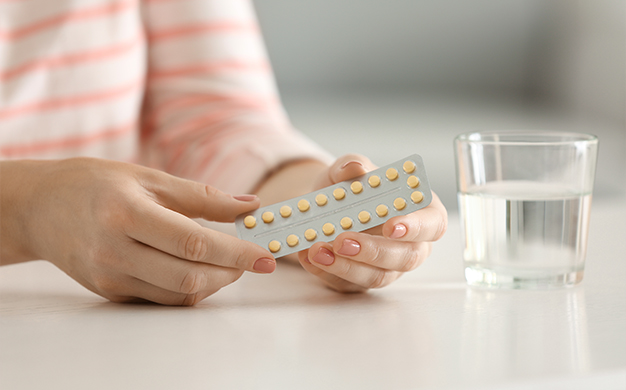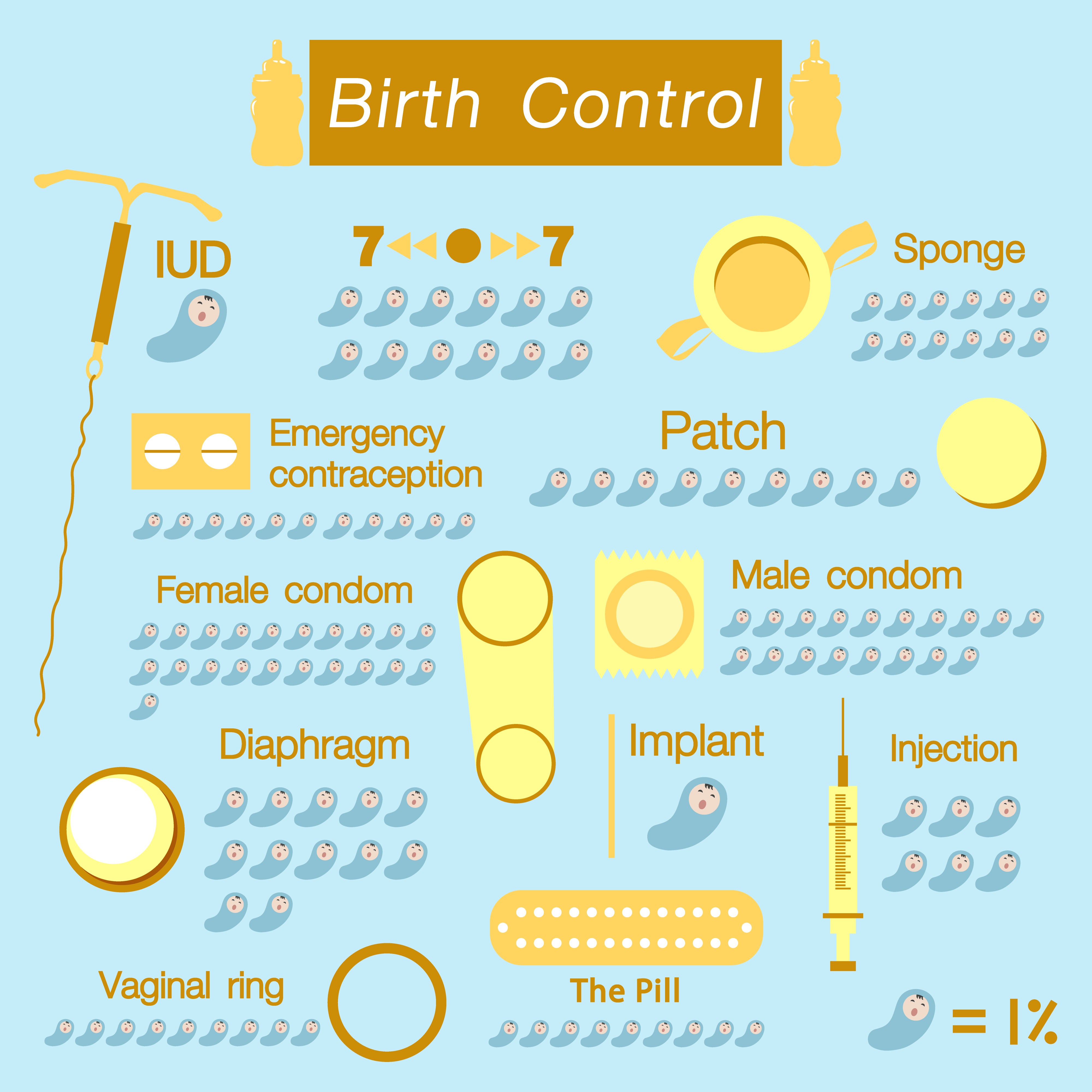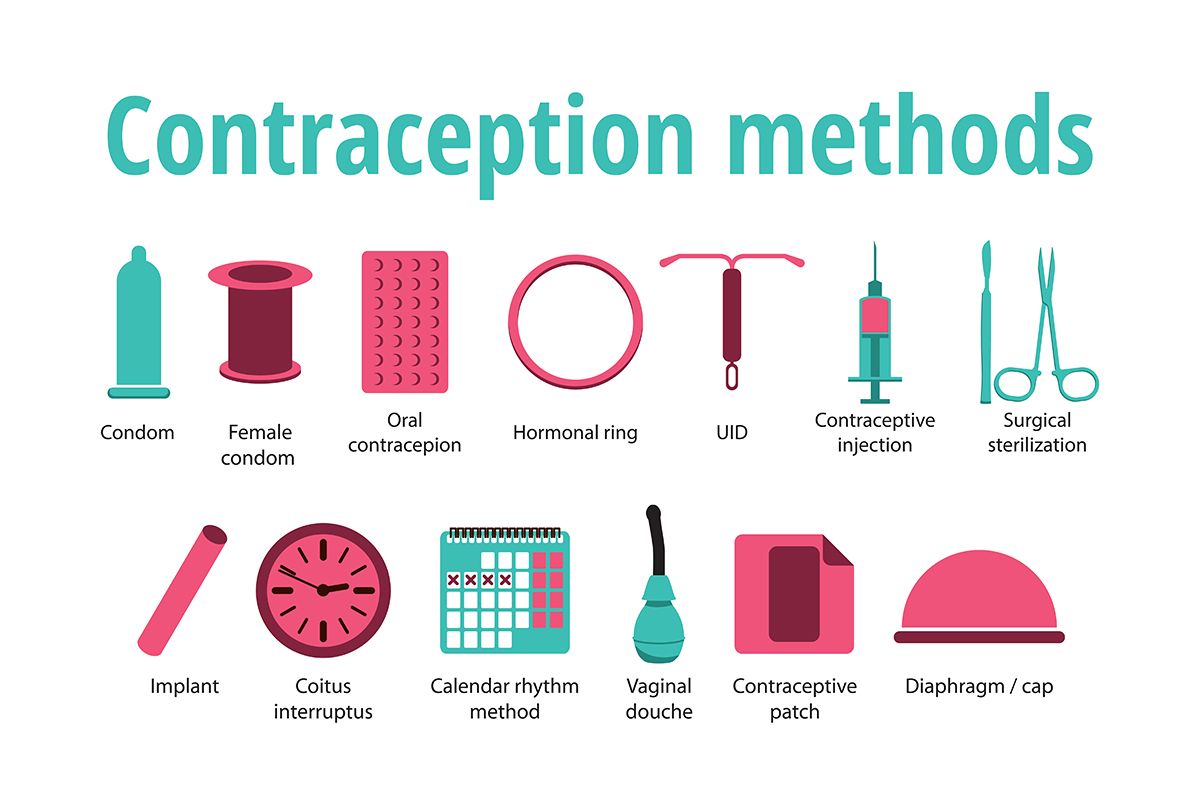Birth control pills, also called oral contraceptives, are considered effective in preventing pregnancy and treating other health issues. These BC pills are the most extensively studied treatment ever prescribed. Most of these medications are made up of two synthetic hormones, an estrogen and a progestin. The pill offers synthetic estrogen each day to prevent the production of hormones FSH (follicle-stimulating hormone) and LH (luteinizing hormone), thus inhibiting ovulation. The progestin component present in the pill causes thickening of the cervical mucus, creating a kind of barrier for sperm. Progestin also makes the lining of the uterus unsuitable for implantation (attachment of the fertilized egg to the wall of the uterus.
Types of birth control pills
Different forms of birth control pills are available. These anticonception pills consist of either the hormones estrogen or progestin, and they must be taken once daily to cause pregnancy. There are 4 types of birth control pills on the market: The combination pill, the progestin-only pill, the extended-use pill, and the emergency birth control pill.
-
- Combination pill
Most people in the US use combination oral contraceptive pills. Estrogen and progestin prevent the release of eggs from your ovaries, and they make changes in your cervix and uterus that lower your chance of pregnancy. People who have a 1% chance of getting pregnant if they take them as prescribed by their health care professional. The effects of birth control pills are easy to reverse, too. The time you want to get pregnant, stop taking these medicines. It is possible to get pregnant straight away. In general, if you miss two of these pills in a row, you will need to use a backup contraceptive method or a nonhormonal birth control method for a week.
Combination pills have benefits beyond birth control. These are considered the best birth control pills.
They help in the regulation of your period and lessen cramping. They can also help minimize the risk of certain cancers. They might clear your acne vulgaris. Brands like Yaz got clinical approval to treat a severe premenstrual syndrome.
Most of them use between 20 and 25 mcg of estrogen along with some progestin. Your healthcare professional may begin you on this level and change it if adverse effects bother you. A low dose may be a good option if you are in perimenopause. They can help eliminate symptoms like irregular periods and hot flashes.
-
- Extended cycle pills
The extended cycle pill is a combination pill that minimizes the number of menstrual periods from 13 menstrual periods to only four a year. That means women who take this type of pill will menstruate only once each season. These combine two hormones that are commonly used in other hormonal contraceptives, followed by a week of inactive pills, which results in a menstrual cycle.
-
- Minipills
These contain only one hormone, progestin. They do contain estrogen and may be given to people who are breastfeeding or have nausea or other adverse effects of estrogen. These thicken the cervical mucus so the sperm can’t reach the egg. The hormone present in the pill also causes a change in the lining of the uterus to avoid implantation. In Some cases, minipil also helps to prevent the release of an egg.
-
- Emergency pill
Emergency contraceptive pills, also known as morning-after pills and Plan B contraceptive pills, are a type of birth control pill that you take to prevent pregnancy after unprotected sex.
Estrogen pills are also available but are considered less effective than combination or other contraceptive pills.
All types of birth control pills are effective in preventing pregnancy. Consult your healthcare specialist to find the best one for yourself.
Uses of birth control pills
Birth control pill is an extremely effective reversible contraceptive method. A lot of people also choose to take the pill because of its other beneficial effects:
-
- Helps in the regulation of menstrual periods
- Treat certain menstrual-related problems such as short periods, reduce the incidence of iron deficiency anaemia, minimize premenstrual symptoms, and provide menstrual regulation.
- Treat symptoms of endometriosis.
- Lowers the incidence of ovarian cysts
- Minimize the risk of ovarian and endometrial cancer
- Can diminish acne
The birth control pill did not affect your ability to get pregnant in the future after you discontinue taking it.
Starting the pill
There are two ways to begin taking the pill:
Quick start: Take your first pill as soon as you get the pack.
Next period: Take your first pill soon after your next period starts.
If you take the first tablet for five days after starting the period, you are protected against unwanted conception. If you take the first pill for more than five days, you should use another contraceptive method, like condoms, for the initial week. You can receive the prescription for the pill from your health care provider.
Once you start using the pill, you must take one pill each day. There is no best time of day to take birth control. You can take it any time, but try to take the pill at the same time each day. Once you finish the pack of pills, you should begin using the next pack the next day. You should have a day without a birth control pill.
If you missed the birth control pill, try to take it as soon as you can. Use an emergency birth control pill in case you have unprotected sex, as a missed contraceptive pill may lead to unwanted pregnancy.
So, what’s the best time to take birth control pill? Well, any birth control pill (emergency pregnancy pill, mini pill, or combination pill) works best when it is taken every day at the same time of the day, regardless of whether you are going to have sex or not. Taking birth control while pregnant is not recommended.




